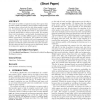41 search results - page 4 / 9 » The Emergence of Social Learning in Artificial Societies |
CCIA
2009
Springer
13 years 8 months ago
2009
Springer
Abstract. Social conventions are useful self-sustaining protocols for groups to coordinate behavior without a centralized entity enforcing coordination. The emergence of such conve...
ATAL
2008
Springer
13 years 9 months ago
2008
Springer
We study the problem of agents locating other agents that are both capable and willing to help complete assigned tasks. An agent incurs a fixed cost for each help request it sends...
TSMC
2002
13 years 7 months ago
2002
Imitation is a powerful mechanism whereby knowledge may be transferred between agents (both biological and artificial). Key problems on the topic of imitation have emerged in vario...
AUSAI
1997
Springer
13 years 11 months ago
1997
Springer
Co-ordination is the glue that binds the activities of autonomous problem-solving agents together into a functional whole. Co-ordination mechanisms for distributed problem-solving ...
KER
2008
13 years 7 months ago
2008
Computational social choice is a new discipline currently emerging at the interface of social choice theory and computer science. It is concerned with the application of computati...

